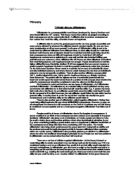However, this view also holds God responsible for the evil in the world, because God knowingly created and sustains such a world. This poses a number of problems. If God is omniscient and intentionally allows the possibility of moral evil caused by human actions, then God knows about the atrocities to which this may lead in the future. By allowing certain humans to make the unethical choice, God is determining and shaping the future of humanity. Therefore, by probability, some evil is predestined and unavoidable, and points to a certain degree of irrelevance of people’s actions, for if their existence and environment weren’t created and determined by God, they wouldn’t have the option of making the choice in the first place.
If humans believe they are making ethical choices, but this is in fact an illusion, they are living in a deterministic world. Hard Determinists reject the possibility of free will; John Locke used the analogy of a man in a locked room to illustrate this. A man goes to sleep in a room that is locked; when he wakes up he chooses not to leave the room, and thinks this is his choice, yet he remains unaware that it is impossible to leave the room even if he should wish to. In the same way, humans believe they make daily ethical decisions when in fact their actions have been pre-determined, and they simply do not know the full causes of their ‘choices’.
For theists, such causes are rooted in God. John Calvin believed that man’s nature was such that one should automatically reject God and opt for the sinful choice, and thus Calvin concludes that if humans had free will, there would be no salvation for anyone. Therefore, God has different plans for different persons, and not everybody is created with the same destiny. Some men are born fated for eternal damnation, and thus will make unethical decisions. However this is not within their control, because such is their destiny. Thus humans who are to be eternally saved will make better moral ‘choices’ because they have effectively been programmed to do so.
Of course, not all Hard Determinists believe that God makes the ethical decisions for us. More modern theories talk about the importance of genetic heritage, psychoanalytic factors and physics as the causes of human behaviour. For instance, Watson suggested that heredity and environment equally influence and determine the ‘decisions’ we make. However, he also believed that if we attempt to change out environment, this would also affect our future decisions. The idea that humans can manipulate the chain of causes in their lives is called ‘conditioning’. In the same way, Pavlov famously made a dog salivate at the ring of a bell. However, some rest their beliefs firmly on biology and evolution; Dawkins for instance argues that the ethical decisions one might make are in fact caused by natural selection.
Soft determinists believe that it is possible to unite the ideas of determinism with free will. While agreeing that all our decisions have some sort of a cause, they are not subject to external pressure. Therefore, humans have as much freedom as is necessary to subsequently claim moral responsibility for their actions. Kant believed that all theoretical human knowledge has been caused, yet their ‘practical reason’ is free. The latter cannot be without freedom, for when we are about to make an ethical decision we always consider ourselves free; our conscience and self awareness is therefore what makes us free to make ethical decisions.







